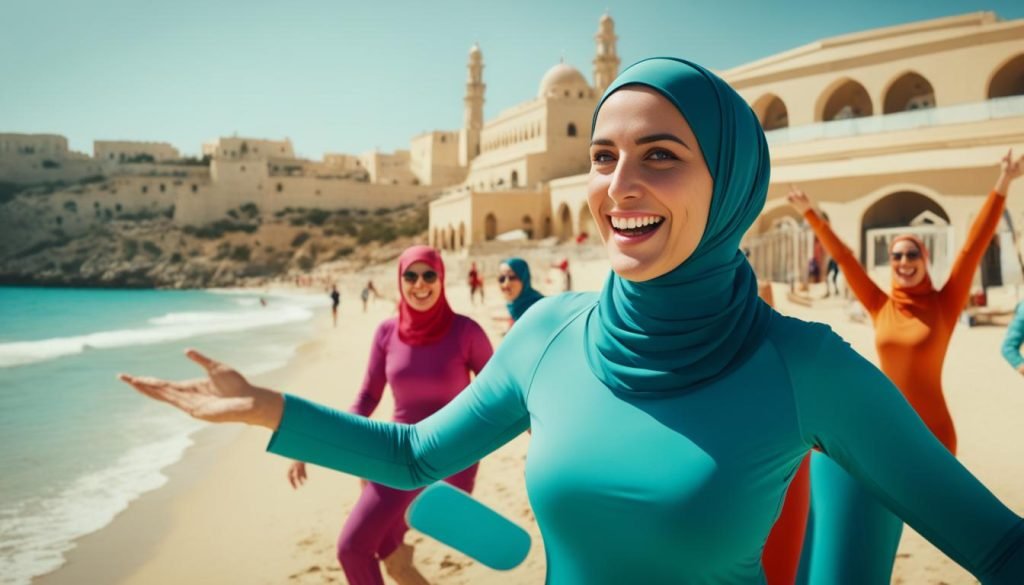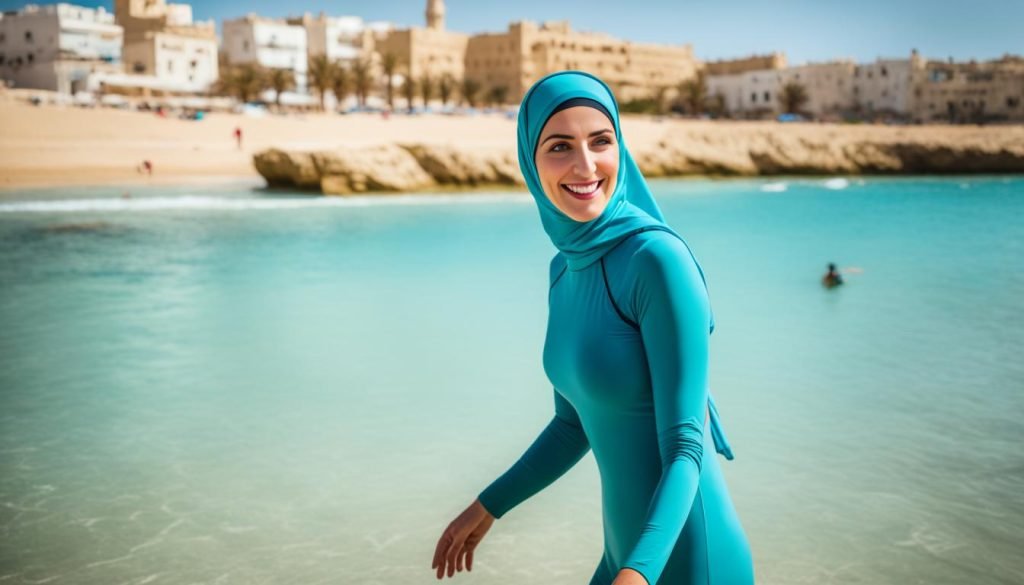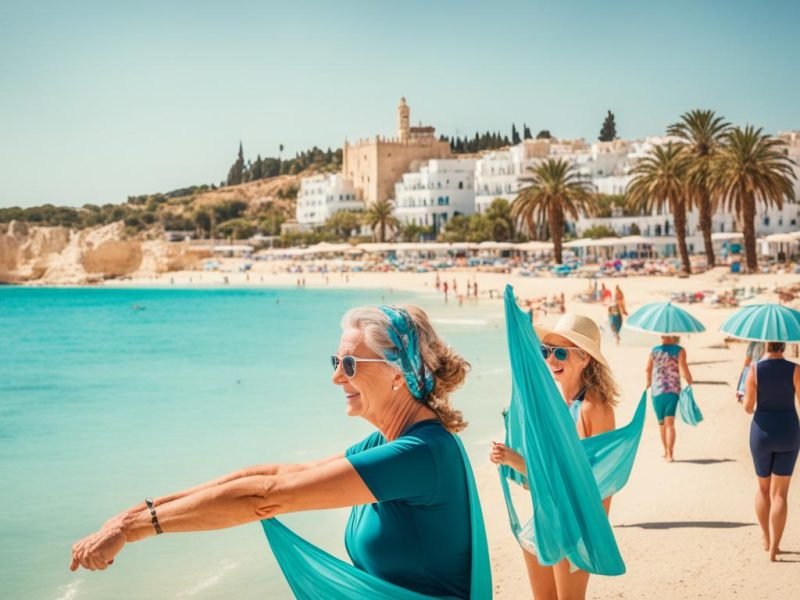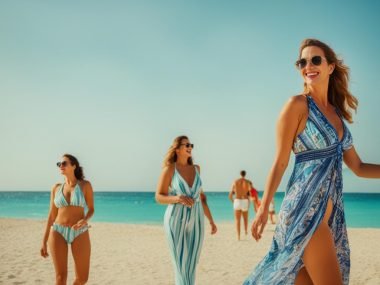The clothes we wear often speak without words. They show our personal beliefs and the struggles to fit in with society. This is very true for beach holidays. In Tunisia, a country full of ancient cities and modern resorts, wearing a burkini raises important questions.
The Burkini Tunisia topic makes me think a lot. The burkini covers the body but also symbolises freedom. This debate is not just about beaches in Tunisia.
It’s about balancing our own freedom with what society expects. This challenge is felt everywhere in Tunisia, from its beautiful beaches to the halls of government. Let’s explore how Tunisia’s culture and modern views can coexist.
Key Takeaways
- Understanding the complexities surrounding the ability to wear a burkini in Tunisia is essential for respecting local customs and personal choices.
- The debate on Burkini Tunisia connects deeply with the nation’s struggle between upholding personal freedoms and catering to diverse visitors.
- The Tunisia Dress Code Burkini issue highlights the ongoing dialogue between religious modesty and secular lifestyles in Tunisian society.
- Recognising the cultural significance of the burkini can enhance one’s perspective on the importance of dress code freedoms in Tunisia.
- Navigating the nuances of the Tunisian approach to swimwear requires sensitivity towards its rich cultural mosaic and ever-evolving identity.
Understanding the Burkini Controversy in Tunisia
The debate over the Tunisian Burkini Ban is heating up. People who stand up for personal freedoms are battling with those who value tradition and hygiene in Tunisian tourism. The Burkini Controversy Tunisia began when tourism officials decided to ban burkinis at hotels and beaches. This reflects a wider global argument over religious outfits and their place in public.
Industry leaders in Tunisia, like Tarak Lassadi and MP Zohra Driss, support the burkini ban. They say it’s to keep standards high and protect Tunisia’s image. Yet, this move has faced strong criticism. Those fighting for human rights and many citizens argue that the ban goes against the Burkini Tunisia Law. They believe it unfairly restricts people.
“The essence of our Constitution is to uphold freedom of personal choice, and this includes attire. Disallowing burkinis not only undermines this principle but also discriminates against a specific group of women.” – an excerpt from a statement by Tunisian human rights organisations.
My research shows a split in Tunisian society’s views. The discussion about the burkini ban isn’t just about swimwear. It’s also about women’s rights, religious freedom, and tourism policies.
- Concerns about hygiene leveraged against the burkini’s compatibility with pool cleanliness.
- Implications for Tunisia’s image as a tourist-friendly destination weighed against individual rights.
- Need for open communication between sectors of civil society and tourism representatives.
Many are pushing for calm talks between tourism bosses and community leaders. They hope to find a balance between personal freedom and Tunisia’s tourism needs. Yet, the disagreement over the burkini remains an unresolved issue in Tunisia.
The Tunisian Approach to Swimwear and Modesty
Tunisia is a country rich in different cultures and traditions. The way they approach beachwear shows a mixture of old and new. Burkini Beachwear Tunisia plays a big role in this, meeting Tunisia Modesty Standards while still joining in modern talks.
What Defines Modesty in Tunisian Culture
Tunisian culture varies greatly in terms of modesty. People often wear clothes that mix personal choice with social expectations. It’s common to see traditional outfits and western wear together. This highlights Tunisia’s diverse identity. For many Muslim women, wearing a burkini is about following modest dress codes and enjoying the beach.
Secular Versus Conservative Perspectives
The debate over Burkini Beachwear Tunisia reflects wider society discussions—Secular Vs. Conservative Tunisia. Opinions on swimwear reflect these broader issues. Secular voices push for freedom in what to wear at the beach. They argue against using old standards to decide beach clothing. On the other hand, conservatives think following cultural norms is key. They argue this preserves Tunisia’s core values.
| Secular Viewpoint | Conservative Viewpoint |
|---|---|
| Advocates for personal freedom in swimwear choice | Supports swimwear aligning with traditional modesty standards |
| Separation of religion from public life and attire | Perception of swimwear choices as reflective of cultural identity |
| Views burkini as an option, not a necessity | Considers burkini as aligning with religious prescriptions for modesty |
The debate on swimwear and modesty in Tunisia is about balancing global trends with local traditions. Despite differences, Tunisians share a goal. They want a society that values many beliefs and celebrates its heritage. Whether it’s supporting Burkini Beachwear Tunisia or discussing Tunisia Modesty Standards, these talks are shaping a more welcoming Tunisia.
Recent Burkini Ban at Tunisian Hotels
As a journalist, I’m deeply invested in travel and culture topics. So, the new Burkini In Tunisia Rules caught my attention. Coastal resorts in Tunisia now ban Burkini Swimwear Tunisia, sparking much debate. Let’s look into what this means for Tunisia’s society.
I’ve found that hotels from Hammamet’s white sands to Sidi Bou Said’s scenic views have new swimwear rules. According to TunisiaBooking.com, over 20 hotels now ban burkinis. This shows the rule is widespread, not just a one-off case.
- Inspection of guests’ attire at poolside and beachfront areas.
- In-house policies that outline permitted swimming garments.
- Increasing reports from guests encountering swimwear restrictions.
The bans are often justified by hygiene and maintaining a certain look, inspired by European customs. This is tricky for those who wish to dress according to their beliefs. The Burkini Swimwear Tunisia issue is at the heart of hospitality, dressing freedom, and cultural expression.
I keep looking into this through personal stories and data. It’s clear: burkini discussions are part of Tunisia’s changing identity. This country mixes Mediterranean allure and a rich tapestry of traditions.
Exploring the Reasons Behind the Burkini Ban
I looked into why Tunisian resorts now limit burkini use. It’s clear the issue isn’t just about what to wear. The decisions include serious thoughts on Burkini Ban Hygiene Concerns and the Tunisian Hospitality Image.

Hygiene Concerns by Tourism Officials
The burkini ban started mainly because of worries about cleanliness. This comes from big names in the industry. I spoke to Traveltodo Tour Operator CEO Tarak Lassadi and MP/hotel figure Zohra Driss. They told me burkinis might make swimming areas less clean. But, some people don’t think the hygiene problem is real with burkinis.
Impact on Tunisia’s Image in Hospitality
Beyond cleanliness, there’s a bigger picture about how Tunisia’s tourism leaders want the country seen. They know how important it is to be viewed well by tourists. Keeping up a good image can lead to more visitors. They believe following common swimwear rules will help keep Tunisia’s hospitality image positive. This means being a place that attracts a variety of guests.
In short, the burkini ban in Tunisia sparks important debates. It’s about keeping things clean vs. upholding the tourism image and respecting personal and cultural clothing choices. As society’s views shift, this topic is sure to keep being discussed in Tunisia and elsewhere.
The Debate on Personal Freedoms and Burkini in Tunisia
In Tunisia, the dress code freedoms stir many conversations. The burkini issue stands out in these talks. It touches the essence of personal freedom in Burkini Tunisia. People firmly oppose policies that limit their rights. This issue balances traditional values and personal choice.
The burkini, a symbol of modesty, raises heated debates here. Tunisia, rich in cultural and religious diversity, finds itself at a crossroad. The discussions go beyond clothing. They reflect the struggle between modernity and tradition. This also includes the right to choose one’s dress.
| Hygiene & Hotel Image | Personal Freedoms & Cultural Expression |
|---|---|
| Focus on the environment for all guests | Advocating for individual choice in attire |
| Preserving the image of Tunisian tourism | Upholding constitutional rights |
| Hotel policies prioritising international standards | Respect for religious beliefs and personal comfort |
Many readers wonder about the impact of these policies. They question if they hinder Tunisia’s progress in personal freedom. This comes especially after the Arab Spring.
“The right to personal expression through dress is enshrined in our constitution, and it must stand as the heart of the matter in any discussion on dress freedoms, including the choice to wear Burkini in Tunisia.”
Tunisian activists stand firm on personal freedoms. They support the right to wear a burkini and what it stands for in Tunisian dress code freedoms. Finding a solution that respects personal freedom to wear a burkini in Tunisia is crucial as discussions continue.
This national debate reveals a mosaic of opinions and laws. At its core, it is about choice, culture, and identity. The burkini symbolises this personal freedom in today’s Tunisia.
Women’s Rights and Burkini Beachwear in Tunisia
In my study on Tunisia’s women’s freedom with swimwear, a key finding is the burkini’s crucial role. It highlights the challenge and commitment to constitutional rights. To understand this issue, we need to examine Tunisia’s Constitution. It promotes personal freedoms, yet recent limitations seem to clash with these rights.
Tunisian Constitution and Dress Code Freedoms
The Tunisian Constitution seems to protect personal dress choices. This has drawn attention. Proponents of Women’s Rights Burkini Tunisia use it to oppose burkini bans. They question if legal dress codes in public areas contradict national laws.
One constitutional article notably opposes a Burkini Tunisia Law that would ban certain swimwear. Reviewing documents and human rights responses, it’s clear. The Constitution is a vital but challenged supporter of women’s rights in Tunisia.
Activists’ Stance Against Burkini Restrictions
Tunisia has a strong group of activists fighting for legal rights and understanding social opinions on dress codes. They strongly oppose the burkini ban. This reflects a large part of society’s belief in protecting state-guaranteed liberties, including dressing choices like the burkini.
My conversations and observations have shown the burkini issue is about more than clothing. It’s part of a larger debate on Women’s Rights Burkini Tunisia. This resistance against dress code rules is a fight for personal choice, cultural identity, and against unnecessary restrictions. These are the freedoms many in Tunisia value highly.
European Influence and its Role in the Tunisian Burkini Ban
The Burkini Tunisia Law has stirred a lot of talk. It’s more complex due to the European Influence Burkini Ban Tunisia. Looking at this influence helps us understand why such laws exist. In history, European styles greatly affected Tunisian life. This mix of cultures is interesting. But, it raises issues when laws like the burkini ban seem to clash with Tunisia’s traditional diversity.
Some people in Tunisia do support the ban. They feel the burkini doesn’t fit with modern, secular views. These views have roots in European thought. The discussion on these swimwear rules is part of a bigger conversation. It’s about how European influence shapes Tunisian views, especially on clothes that show religious identity.
| European Influence | Tunisian Perspective | Outcome |
|---|---|---|
| Secular Attitudes | Adoption of Modern Ideals | Support for Burkini Ban |
| Cultural Dominance | Shaping of Dress Code Norms | Restrictive Swimwear Policies |
| Historical Ties | Legacy and Continuation of Past Influences | Persistent Controversy over Religious Attire |
Respecting Tunisia’s mix of cultures is key. We must find a balance. This balance should respect rights, including how we dress. The Burkini Tunisia Law debate shows this. Laws on clothes should respect freedom and cultural diversity.
Can You Wear Burkini In Tunisia? The Current Legal Stance
Exploring Tunisian culture and laws shows that Burkini Law Tunisia isn’t clear-cut. There’s no ban across the country. Instead, Burkini Legal Status Tunisia varies by location, from beach to beach, hotel to hotel. As a traveller, navigating this can be tricky.

Picture a sunny beach with the Mediterranean sea nearby. Yet, there’s doubt about wearing a burkini. Women’s experiences with burkinis in Tunisia vary greatly, much like the country’s traditional Malouf music. Here’s an overview of how different places in Tunisia handle burkinis:
| Location | Policy on Burkinis | Additional Notes |
|---|---|---|
| Hotel A | Permitted | Commitment to cultural sensitivities |
| Beach Resort B | Ban enforced | Cites hygiene concerns |
| Hotel C | Permitted in designated areas | Attempts to balance preferences |
| Private Beach D | No restrictions | Embraces full personal freedoms |
| Spa Hotel E | Ban enforced | Maintains a uniform image of modernity |
The Burkini Law Tunisia situation is complex. It challenges the balance between personal freedom and business rights. When discussing it, it’s essential to consider both legal and moral perspectives.
Tunisian Society’s Divide: Public Sentiment on Burkini Swimwear
In Tunisia, changes in clothing norms after the revolution have sparked deep discussions. The debate around the burkini shows a clear division in society. Let’s look into how people feel and react to the burkini.
Public Opinions Following the Revolution
The 2011 revolution changed Tunisia in many ways, including its culture. More women started wearing hijabs, showing a shift towards conservatism. This change coincided with efforts to ban the burkini in public places, linking closely to the nation’s political climate. The debate over the burkini brings up important questions about identity and freedom.
Societal Reactions to Burkini Usage
Opinions on the burkini are divided, underlining the division in Tunisian society. Some people argue against the burkini, wanting it banned from public areas. On the other hand, many defend the right to choose what to wear, criticizing the bans as discriminatory. This debate reflects a broader challenge between secular and religious views in Tunisia. It also shows the country’s struggle to balance modernity with its cultural heritage.
Wearing the burkini is an exercise in personal freedom, reflecting a set of values that rhetorically question where the boundaries of individual liberties and societal norms intersect.
Personal Stories and Experiences with the Burkini Tunisia Law
Understanding the human aspect of the Burkini Discrimination Tunisia debate is enlightening. I’ve conversed with several women about their experiences with the Personal Experiences Burkini Ban Tunisia. Their stories highlight the need to rethink the ban.
Jannette Mensi’s experience at a Marriott Hotel in Sousse is one such story. It showcases the emotional impact these bans have. She told me,
“It was a mix of shock and humiliation. There I was, a guest, being told that my choice of swimwear was unacceptable.”
Jannette’s experience reflects a broader issue. Many have shared their stories on social media and forums.
This table shows instances of burkini discrimination in Tunisia. It also notes the positive changes some places made after these incidents.
| Hotel/Location | Incident Description | Outcome |
|---|---|---|
| Marriott Hotel, Sousse | Guest rebuked for wearing a burkini; felt discriminated. | After a public outcry, the hotel allowed burkinis. |
| Tunisian Beach Resort | Several guests were discreetly advised against wearing burkinis. | They began reviewing policies; some staff received cultural sensitivity training. |
| Private Pool, Tunis | A woman was asked to leave for wearing a burkini. | Management apologised; they informed staff about religious garments. |
A clear pattern emerges from these stories. Initial discrimination is followed by change once the issues are raised. These efforts show the strength and persistence of those facing Burkini Discrimination Tunisia. Their stories are not just incidents but are calls to action, inspiring more dialogue on this topic. Writing these narratives strengthens my resolve to help drive change.
How Tourists Can Navigate Burkini In Tunisia Rules
When planning to visit Tunisia, I always make sure I can swim in what I feel comfy wearing, like a burkini. It’s important to know the Navigating Burkini Rules Tunisia for a worry-free trip. That’s why having a Tourist Guide Burkini Tunisia is key to sticking to local customs without giving up my dress preferences. Here’s how I figure out the rules for wearing a burkini:
- I start by looking up which places allow burkinis. I find lots of info from people who’ve been there before on travel sites and reviews.
- Then, I contact the places I’m thinking about staying to ask about their policy. A quick email or call usually clears things up.
- It’s also a good idea to keep an eye on the news. Sometimes, rules change because of what people talk about or new laws.
Talking openly with the place you choose to stay helps a lot. A respectful chat can make sure they understand what you need. Plus, it helps both sides get along better.
After all my research, I’ve put together a list for others looking for places that are okay with burkinis. Below, you’ll see how different spots in Tunisia vary in their approach to burkinis.
| Hotel/Resort Name | Location | Burkini Policy | Facilities |
|---|---|---|---|
| Hotel Serenity | Hammamet | Permitted in all hotel pools | Main pool, Women-only pool, Spa |
| Beachside Retreat | Sousse | Permitted with prior notification | Private beach access, Indoor swimming pool |
| Oasis Resort | Djerba | Not allowed in the main pool | Kids’ pool, Private bungalows with plunge pools |
| Blue Lagoon Hotel | Tunis | No restrictions | Outdoor and indoor pool, Beachfront |
| Sahara Sands | Tozeur | Permitted in designated hours | Desert excursions, Natural spring pool |
By understanding the Navigating Burkini Rules Tunisia, I ensure my stay in Tunisia is enjoyable. It lets me soak up the local culture and beautiful beaches without compromising my choice of swimwear. I hope this Tourist Guide Burkini Tunisia helps you have a great holiday, too.
Conclusion
The discussion about the Tunisia Dress Code and the burkini touches on more than clothes. It dives into cultural values, freedom, and how it affects tourism. My look into this topic covers many angles. This includes modest swimwear questions and the strong European influence in Tunisia. The different views on the burkini show how Tunisia is caught between the new and the old.
Tunisia is at a significant point where personal freedom meets public rules. The burkini talks show a wider issue. It’s about balancing respect for personal rights with the community’s norms and how others see us. This evolution shows how Tunisia is changing, staying open yet true to its people’s diverse needs.
The debate on the burkini keeps evolving, showing changing views and rules. It’s a debate that goes beyond Tunisia, sparking talks on how countries deal with their traditional values in a globalised world. I hope the discussions stay respectful and enlightening. They should celebrate cultural identity and each person’s freedom.







